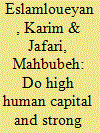|
|
|
Sort Order |
|
|
|
Items / Page
|
|
|
|
|
|
|
| Srl | Item |
| 1 |
ID:
181473


|
|
|
|
|
| Summary/Abstract |
This paper advances research in the resource curse literature in several directions. Firstly, using different measures of oil dependence and abundance, it investigates the validity of the oil curse hypothesis in energy-rich developing countries. Secondly, the paper studies the impact of human capital, institutional quality, and trade openness on the growth of these countries. Thirdly, it examines the interaction effect of human capital and oil dependence/abundance on the growth of oil-rich developing counties. Fourthly, we estimate a set of panel data models by the Generalized Method of Moments (GMM) to address the endogeneity problem. The estimation results confirm the oil curse hypothesis. Furthermore, our findings underscore the significant role of higher human capital, better institutional quality, and trade openness in boosting economic growth. These results are robust to the way the quality of institutions is measured. Moreover, we find a threshold level for human capital above which the oil curse vanishes. Our finding, hence, highlights the crucial role of human capital in offsetting the adverse effect of oil abundance/dependence on output growth. The fact that poor quality of human capital and weak institutions hinder economic growth has important policy implications for social planners and policymakers in oil-rich developing countries.
|
|
|
|
|
|
|
|
|
|
|
|
|
|
|
|
| 2 |
ID:
134864


|
|
|
|
|
| Summary/Abstract |
Using the common correlated effects mean group (CCEMG) technique to a set of balanced panel error correction model, we examine the effects of the Asian financial crisis of 1997, and the global financial crisis of 2008 on the behavior of saving and investment in East Asian countries. Our results show that saving and investment rates are highly dependent across countries of East Asia. This finding underlines the importance of taking into account cross-sectional dependence when analyzing saving–investment relationship. The results also indicate that the adverse financial shock of 1997 has negatively affected the short run correlation between saving and investment, but has not influenced their long run relationship. Our finding, hence, verifies the prediction of new open economy macroeconomic theories regarding the divergence of short run saving–investment from its long run trend for East Asia. Moreover, we find that the global financial crisis of 2008 has not affected the saving–investment dynamics in this region. It means that the consequences of the Asian and global financial crises for saving–investment dynamics are not the same in East Asia. One might attribute these differences to the origins of these two shocks, i.e., internal versus external to the region. These findings may have some policy implications for those countries that rely heavily on foreign investment and are subject to various internal and external financial shocks.
|
|
|
|
|
|
|
|
|
|
|
|
|
|
|
|
|
|
|
|
|